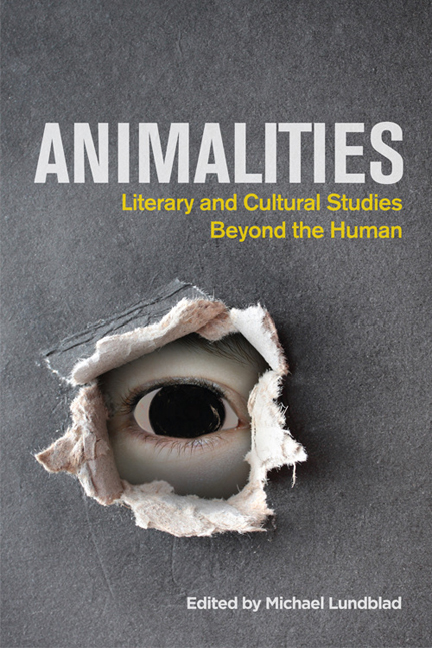Book contents
- Frontmatter
- Contents
- List of Figures
- Acknowledgments
- Introduction: The End of the Animal – Literary and Cultural Animalities
- 1 Each Time Unique: The Poetics of Extinction
- 2 Posthuman New York: Ground Zero of the Anthropocene
- 3 J. G. Ballard's Dark Ecologies: Unsettling Nature, Animals, and Literary Tropes
- 4 Staging Humanimality: Patricia Piccinini and a Genealogy of Species Intermingling
- 5 “Sparks Would Fly”: Electricity and the Spectacle of Animality
- 6 The Nature of Birds, Women, and Cancer: Terry Tempest Williams's Refuge and When Women Were Birds
- 7 Animality, Biopolitics, and Umwelt in Amitav Ghosh's The Hungry Tide
- 8 Looking the Beast in the Eye: Re-animating Meat in Nordic and British Food Culture
- 9 Love Triangle with Dog: Whym Chow, the “Michael Fields,” and the Poetic Potential of Human-Animal Bonds
- 10 Bestial Humans and Sexual Animals: Zoophilia in Law and Literature
- Notes on Contributors
- Index
8 - Looking the Beast in the Eye: Re-animating Meat in Nordic and British Food Culture
Published online by Cambridge University Press: 07 December 2017
- Frontmatter
- Contents
- List of Figures
- Acknowledgments
- Introduction: The End of the Animal – Literary and Cultural Animalities
- 1 Each Time Unique: The Poetics of Extinction
- 2 Posthuman New York: Ground Zero of the Anthropocene
- 3 J. G. Ballard's Dark Ecologies: Unsettling Nature, Animals, and Literary Tropes
- 4 Staging Humanimality: Patricia Piccinini and a Genealogy of Species Intermingling
- 5 “Sparks Would Fly”: Electricity and the Spectacle of Animality
- 6 The Nature of Birds, Women, and Cancer: Terry Tempest Williams's Refuge and When Women Were Birds
- 7 Animality, Biopolitics, and Umwelt in Amitav Ghosh's The Hungry Tide
- 8 Looking the Beast in the Eye: Re-animating Meat in Nordic and British Food Culture
- 9 Love Triangle with Dog: Whym Chow, the “Michael Fields,” and the Poetic Potential of Human-Animal Bonds
- 10 Bestial Humans and Sexual Animals: Zoophilia in Law and Literature
- Notes on Contributors
- Index
Summary
Introduction
A square-jawed man with a cigarette in the corner of his mouth and a five-o'clock shadow stares up from the magazine page. It is a chunky publication, with thick pages made of recycled paper and the surprisingly unpleasant chemical smell one associates with organic ink. He looks tough but charming, and poses just like James Dean or Marlon Brando did a couple of generations ago. He is handsome, he is macho, and he is a chef. When even Norwegian foresters and farmers suffer from obesity and bad backs, and athletes occasionally are charged with using both steroids and other drugs, young men might seek their authentic heroes elsewhere. Does the new hipster kitchen offer an alternative venue for certain ideas of heterosexual masculinity? According to this magazine and many others like it, in some kitchens, and in celebrity chefs’ kitchens in particular, there are men who know the anatomy of the beast; they can dismember, disjoint, and transform any animal into any meal in no time. These men deal with whole animal carcasses rather than bits of fillet wrapped in polystyrene foam.
Devouring meat has always been linked to power and strength. Power, because in a historical context, levels of meat consumption have always been linked to levels of wealth and subjugation. Strength, because meat and protein stemming from meat are physiologically linked to muscles and culturally linked to masculinity. Even within Hinduism meat consumption is referred to as a necessary part of the diet among members of the warrior caste. That meat consumption is an important part of being a heterosexual man in Western society is old news for anyone interested in gender and animal studies. But how is meat consumption projected in the present popular discourse in the Nordic countries? The magazine cover described above is an example of an ongoing and maybe accelerating trend, and is part of a contemporary discourse in the Anglophone world as well. According to Joanne Hollows, in the U.K., kitchen heroes like Gordon Ramsay and Jamie Oliver can be linked to dominant cultural norms of masculinity.
- Type
- Chapter
- Information
- AnimalitiesLiterary and Cultural Studies Beyond the Human, pp. 168 - 189Publisher: Edinburgh University PressPrint publication year: 2017



